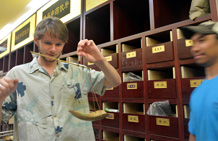
Development of Chinese anti-malaria medicine beneficial to developing countries: Guinean expert
Source: Xinhua
Updated: 2015-10-07
CONAKRY, Oct. 6 (Xinhua) -- Guinea's Deputy Coordinator for the National Anti-Malaria Program Dr. Timothee Guilavogui on Monday expressed confidence that "the development of traditional Chinese medicine will contribute to helping developing countries to resolve their public health problems."
Speaking to Xinhua in an interview in Conakry, Guilavogui hailed Chinese pharmacologist Tu Youyou for her research that led to the discovery of Artemisinin, a drug that has significantly reduced the mortality rates for patients suffering from malaria.
On Monday, Madam Tu, alongside Irish-born William Campbell and Japan's Satoshi Omura were jointly awarded the 2015 Nobel Prize for Physiology or Medicine for discoveries that helped doctors fight malaria and infections caused by roundworm parasites.
According to the Nobel Assembly at Sweden's Karolinska Institute, Tu won half of the prize while Campbell and Omura were jointly awarded the other half of the prize. She is the first Chinese women national to win a Nobel Prize.
"These drugs came at a time when chloroquine had proved to be ineffective," the Guinean expert noted, adding that "if there had not been a discovery of an alternative solution, many children would have died from malaria because there was no scientific solution."
Dr. Guilavogui said the discovery of Artemisinin helped to respond to the public health problem linked to malaria, because according to him, children in developing countries who get access to the drug get healed 100 percent.
He noted that Madam Tu who made the discovery deserved the Nobel Prize, even though there are other African experts who have also done enormous work on trying to find a cure for malaria and that they should be encouraged to continue with their efforts.
The Guinean expert was full of praise of China's contribution in the fight against malaria, noting that "most of the research and strategies for fighting against the disease were developed in China."
"If you take for example the strategy for elimination of malaria through mass treatment that is currently used in some countries like the Comores Islands, it was a discovery of Chinese professors," Guilavogui recalled.
It is because of such Chinese discoveries that the Guinean expert said most countries will get rid of the scourge of malaria.
According to official statistics from Guinea's public health ministry, the country records at least 10 malaria-related deaths weekly.
However, results of certain surveys have shown that the introduction of Artemisinin in the treatment of malaria among children has considerably contributed to reduction of mortality rate.
Results of a population and health survey conducted in 2012 showed that Guinea has a 44 percent prevalence rate of malaria, with rural areas recording 53 percent prevalence rate and urban centers recording 18 percent prevalence rate.

World Family Summit
The World Family Organization was founded in Europe in 1947 and headquartered in Paris.
Link: / World Health Organization / United Nations Population Fund / UNICEF in China
Copyright 2014 National Health and Family Planning Commission of the PRC All rights reserved






